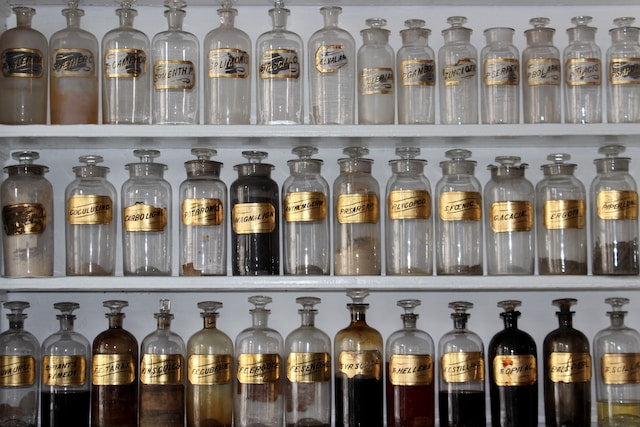

· By Brooke Hamilton-Benjestorf
Our Vessels and What We Fill Them With
Jar-lined walls on worn wooden shelves, each shape as different as a body - tall, stretching its neck toward the ceiling, short and squat, poised to receive and be filled. This wabi-sabi sort of organization of our personal self-care apothecaries lifts a unique sort of energy up through my toes and into my skull and Third Eye. This is the way they used to live, I used to live. This is the way my blood remembers what it was like to care for my sanctuaries - myself and my home.
Buying bulk and refilling upcycled jars that speak to us does more than impact the health of the earth. It impacts our gut, the part of us that taps into our own energies and intentions. Because it is ancient ritual. Throwaway containers are new and ungrounded, hurting all of us on multiple planes. Realistically, more than we are often willing to acknowledge.
Without bogging our spirits down with an endless list of landfill stats, though they are there for the reading, I want to illuminate just two categories - our plastic container waste generated in the laundry room and our plastic container waste generated in the bathroom. Approximately 1 billion laundry jugs are discarded annually in the United States, with only about 30% of them recycled [1]. And according to a report from the EPA, 14.5 million tons of plastic containers and packaging from our self-care routines were discarded in 2018, again with only 30% of them recycled. And one more, because it’s potent: also according to the EPA, 10,090 tons of plastic containers and packaging were landfilled in 2018. Whereas in 1960, we landfilled 120 tons. In less than 60 years, our waste production is ninefold [2].
Production is not slowing down. Barring an unpredicted mass earth-scale event, it won’t in our lifetimes. It’s our personal habits and choices that have to make the change, to adjust for the mindlessness of big business that we can do so little to control. Thankfully, this change can be a joy. It can mean new life for winsome, old containers. It can mean the sun shining through the window into your pear-shaped jar of refilled dish soap to create a brushstroke of rainbow on the hardwood, or even your toes. Thank god for this play of light and the ancient splash of colors it has painted into your day! It can mean a livening walk or songful drive to your local minimalist store to chat with the men and women who work there, who you’ve cultivated a relationship with, who enrich your day as you move through something we might be tempted to call a chore. But we know it, deep in our blood, to be a sacred ritual that extends from self-care to community.
Slowing down enough to notice the container, to think about the ingredients, to organize something in a beautiful arrangement, gives way to a flow within our lives that frees us up to tap into what is important. Intention brings freedom and a sense of ease so tragically foreign to our modern lives. When we trade natural ease for unnatural convenience, we cut ourselves off from the planet’s health and our own. Stop. Breathe. Look. Smell. Take the time to engage. This lifetime may be your single, conscious chance to take it in.
[1] https://www.treehugger.com/ditch-laundry-jugs-and-go-plastic-free-4858737
Photo by Matt Briney on Unsplash